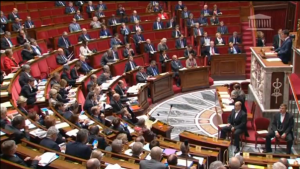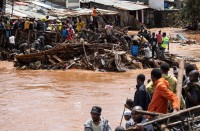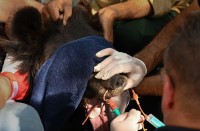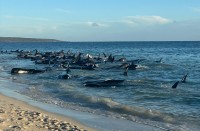 A French water and waste company has teamed up with the country’s crack counter-terrorism unit to protect water systems from terror attacks during global climate talks that kick off on November 30 in the French capital.
A French water and waste company has teamed up with the country’s crack counter-terrorism unit to protect water systems from terror attacks during global climate talks that kick off on November 30 in the French capital.
Some 40,000 to 45,000 people are due to attend the event north of Paris and 138 heads of states have signed up for the opening ceremony, which takes place just over two weeks after jihadists murdered 130 people in the capital.
While Veolia and the special police unit RAID — which stands for Research, Assistance, Intervention, Deterrence — made the plans some time ago, the Islamic State attacks on November 13 have put the security forces on high alert.
World leaders will discuss plans to curb greenhouse gas emissions and prevent global temperatures rising more than 2 degrees Celsius above pre-industrial levels at the event, also dubbed COP21, at Le Bourget north of the capital.
Veolia has installed a series of sensors at key points in the water network which continually monitor pressure, chlorine levels, temperature and conductivity – parameters that should signal if there is any contamination of the water supply.
“Veolia has systems that allow it to check the water drinkability at all times. For the climate conference, we worked ahead of time with the anti-terror units, especially the RAID and the DCI (French interior ministry service in charge of international police cooperation), which allowed us to integrate various sensors in the device in order to quickly alert authorities when they host the guests of COP21 climate conference so they are able to protect people by moving them or by closing some pipes,” Veolia’s head of security Jean-Louis Fiamenghi, who was in charge of RAID from 2004 to 2007, told Reuters on Monday (November 23).
The sensors will alert authorities if any foreign substances are added to the water network, after which RAID will step in if the alert is confirmed, he added.
Fiamenghi said that at this point in time, there had not been any threat of a nuclear, biological or chemical nature at any Veolia sites across France and that the company had included the risk in the context of their annual exercises.
Last week, French Prime Minister Manuel Valls warned of the risk of a chemical or biological attack such as the sarin gas attack in the Tokyo subway in 1995.
“We can’t exclude anything today, and I say this with all necessary caution, but we know, we keep in mind, that there could be the risk of chemical and biological weapons,” Valls said before lawmakers.
Veolia tried out its water sensors in Shanghai during the World Expo in 2010 and at the London Olympics in 2012.
The system was first used in anger at the Francophone Games in the southern French city of Nice in 2013.
“Our defence is the security measures that have always been in place on our water supply networks. Once again the prefectures check our devices, each year we have several drills to test the strength of our protection devices,” Fiamenghi said.
Asked whether there were risks for such sensitive companies as Veolia to see radicalised employees conduct attacks from the inside, Fiamenghi said that Veolia had set up some measures in order for Human Resources to detect any at-risk behaviour.
“Yes, indeed. We have set up a certain surveillance. We work with Human Resources to know what being radicalised is like. We also work with the intelligence services, because these are very subtle issues. It’s not because you have a beard that you are radicalised. This a permanent work with the intelligence services that enables us to see if our employees can be dangerous or not,” he said.
Last June a delivery man with known Islamist connections beheaded his boss and left the body, daubed with Arabic writing, at the site of a U.S.-owned gas factory in southeast France before trying to blow up the complex.
The assailant rammed his delivery van into a warehouse containing gas canisters, triggering an initial explosion, and was arrested minutes later as he tried to open canisters containing flammable chemicals. (Reuters)







